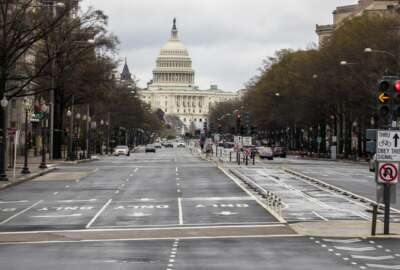
Hubbard Radio Washington DC, LLC. All rights reserved. This website is not intended for users located within the European Economic Area.
Hubbard Radio Washington DC, LLC. All rights reserved. This website is not intended for users located within the European Economic Area.
Sometimes federal employees are eligible for hazardous duty pay. Now a lawsuit alleges numerous employees didn't get it.
Best listening experience is on Chrome, Firefox or Safari. Subscribe to Federal Drive’s daily audio interviews on Apple Podcasts or PodcastOne.
Federal employment is not only about sitting in cubicles or offices, contemplating policy, counting beans, and planning budgets. Bureau of Prison guards are often inches away from people. Agriculture workers go into factories and farms where people and animals might be sick. Sometimes such employees are eligible for hazardous duty pay. Now a lawsuit alleges numerous employees didn’t get it. For more, the Federal Drive with Tom Temin spoke to the lawyer helping it all, Heidi Burakiewicz.
Interview transcript:
Tom Temin: Mrs. Burakiewicz, it’s good to have you back.
Heidi Burakiewicz: Thank you for having me.
Tom Temin: All right, so this is a AFGE lawsuit and on behalf of Agriculture and BOP employees. Tell us about some of the cases, because when you really get into them there, it’s rough stuff.
Heidi Burakiewicz: So we filed a case in conjunction with AFGE, and we’re filing the case as a class action on behalf of all federal workers who are going to work and getting exposed to the coronavirus. The original complaint has five plaintiffs, but again, we’re seeking to have the case certified as a class action on behalf of the entire federal workforce who is exposed. Three plaintiffs work for the Federal Bureau of Prisons in Oakdale, Louisiana. I’m incredibly worried about the institution down there. The numbers are constantly changing. There’s a large number of inmates who tested positive, who have been hospitalized. A large number of staff, the institution was already understaffed, as the Bureau of Prisons is nationwide. This is really crippling the staff down there. They’re doing a tremendous job. But there are staff that are working 40 hours straight.
Tom Temin: Sure. Just one clarification question. As prison guards, is that considered law enforcement? So in normal times they would just get normal pay based on the scales for prison guards but not hazardous duty.
Heidi Burakiewicz: Correct. The correctional officers are considered law enforcement. Everyone that works at a prison is considered law enforcement, and they do not only get hazardous duty pay. The hazard that we’re looking for here, we believe that they are being exposed to a virulent biological, the coronavirus, and that entitles them to 25% extra base.
Tom Temin: From my understanding, it is up to management, it’s incumbent on management, to determine whether someone is in hazardous duty and should be BOP officials have done this in this case.
Heidi Burakiewicz: Absolutely. The statute exists, the regulations exist, entitling these employees to pay. OPM has opined that the coronavirus would qualify as a virulent biological. It is outrageous that these employees are not already receiving hazardous duty pay. More outrageous, these employees, absolutely without a shadow of a doubt in my mind, are entitled to this pay. They’re going to work in already dangerous situations, but now they’re having to deal with a coronavirus. But also we really urge and we want to call attention to the fact that the government is not providing these employees with sometimes any personal protective equipment or insufficient personal protective equipment. The government has failed to take common sense measures to protect these employees. They’re still transporting inmates from one institution to another as of this week, and all they’re doing is spreading the virus from one place to another.
Tom Temin: So they should be where the guards should be wearing hazmat suits, I guess. In effect,
Heidi Burakiewicz: Yes, the employees absolutely need, you know, the same type of personal protective equipment that hold professionals are wearing in hospitals because they’re coming into very close proximity within a two tested positive or are exhibiting symptoms for the coronavirus. One of the plaintiffs in the case two weeks ago escorted an inmate to a hospital. He asked his supervisor, do I need a mask, and was told no. This inmate was exhibiting very bad symptoms that necessitated he be taken to an outside hospital, and later he was the first inmate to die within the federal system. It outrageous that the government sent these employees in a confined space with this inmate to the hospital and gave them absolutely no protective of it.
Tom Temin: And you also have a Veterans Affairs employees involved here, too.
Heidi Burakiewicz: Yes, one of the names plaintiffs works at a VA hospital in Portland, Oregon. He performed a procedure on a patient who had actually tested positive already for the coronavirus. Outrageously, no one at the hospital gave this employee a heads up that he was working with a patient who had tested positive. This employee’s later contracted the coronavirus and tested positive himself and took it home to his wife, his young children and his very elderly father in law who lives with him. Fortunately, the whole family is recovering in doing well right now.
Tom Temin: Tell us about the Agriculture employees that are also part of your class action suit.
Heidi Burakiewicz: Absolutely. These employees are vital and necessary to our country. Right now, it is important that we have these food and safety health inspectors go into the plans where our food is being produced to make sure it’s being produced, stored and shipped safely. If we don’t have them doing that, we won’t get food on those grocery store shelves. The plaintiff in the case was working out in industry plants, and she was exposed to at least two employees in the plant who tested positive for the coronavirus. She had absolutely no protective gear on whatsoever.
Tom Temin: And I guess the additional danger might be the stuff they’re inspecting itself could have it. Chickens. What have you heard, if anything, from management? If they went ahead and granted these people the hazardous duty pay, then all would be well, I guess, correct?
Heidi Burakiewicz: Nothing would delight me more than having to withdrawal this complaint from federal court because it was mute and the government stepped up and did the right thing. These employees should not have to sue to get hazard duty pay that they’re already entitled to. We want more than anything for the government to agree right now to pay hazard duty pay to all the employees who have been exposed, these people who can’t telework like the rest of us who are continuing to go to their jobs. Keep the country running, keep us safe, get food on our shelves. The government needs to do the right thing and give them hazard pay right now. In addition, the government needs to make sure that these employees have the equipment that they need and are safe while they’re at work as much as possible.
Tom Temin: And you are, of course, are the person who filed the class action suits with respect to the federal shutdowns in 2013 and last year. Do you have the same mechanism in place for people that think they might be due hazardous duty pay to sign up for this latest class action suit?
Heidi Burakiewicz: It’s similar. So in the shutdown litigation under the law that we were suing under the fair Labor Standards Act, it requires each individual employees to sign up for the case. The law that we’re suing under now Title Five of the U.S. Code that requires hazardous duty pay or environmental differential pay. We’re seeking to have this case certified as a class action. If we get it certified as a class, everyone will automatically be covered by the case. However, we’ve set up in the email account Covid19HazardPay@KCNlaw.com. And we’re encouraging employees who think they might be covered by the case to reach out to us. Not only so that we can make sure that everyone, all types of employees, all agencies, are covered by our case. But also, we want to hear the stories about what people are dealing with so we can help call attention to the changes that the government really needs to make now to protect these vital employees.
Tom Temin: And to get in on this, can any agency employees join in, and do they have to be an AFGE to get in?
Heidi Burakiewicz: No, there’s no requirement that you are affiliated with AFGE to be part of the case, however, I cannot emphasize how vital and important AFGE’s role has been in the litigation and representing federal workers and looking out for their safety during this crisis. There are some agencies or categories of employees unfortunately, who are not covered by the law. For example, TSA screeners. Employees whose position description already takes into consideration a virulent biological exposure in the classification of their job, or Title 38 employees who worked for the Department of Veterans Affairs. So we’re really urging Congress to pass legislation to make sure these other categories of employees are also covered and entitled to the hazard. The House stimulus bill included a provision to make sure that TSA employees were brought under the protections of law. Unfortunately, that language was removed from the version that the Senate eventually passed. So we’re hoping that Congress will do the right thing and make sure that the rest of these employees are also covered.
Tom Temin: As always. Thanks so much for joining me.
Heidi Burakiewicz: Thank you so much for having us.
Copyright © 2024 Federal News Network. All rights reserved. This website is not intended for users located within the European Economic Area.

